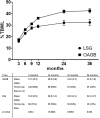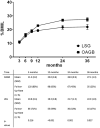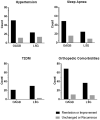Clinical outcomes after one anastomosis gastric bypass versus sleeve gastrectomy in super-super-obese patients
- PMID: 34704152
- PMCID: PMC9085670
- DOI: 10.1007/s00464-021-08790-7
Clinical outcomes after one anastomosis gastric bypass versus sleeve gastrectomy in super-super-obese patients
Abstract
Background: Bariatric surgery in super-super-obese (SSO) patients remains a continuous challenge due to intraabdominal fat masses, higher liver volume and existing comorbidities. A convenient procedure in SSO patients is one anastomosis gastric bypass (OAGB). The aim of this study was to compare the outcome of SSO patients undergoing OAGB in comparison to laparoscopic sleeve gastrectomy (LSG).
Methods: We retrospectively reviewed data from SSO patients who underwent OAGB and LSG in our institution between 2008 and 2020. Primary endpoints included percentage total body weight loss and percentage BMI loss at 12, 24, and 36 months after the operation. Secondary endpoints were perioperative complications, procedure length, length of hospital stay and outcome of comorbidities.
Results: 243 patients were included in this study. 93 patients underwent LSG and 150 underwent OAGB. At any of the time points evaluated, weight loss in patients after OAGB was greater than in LSG patients, while procedure length was significantly shorter for OAGB than LSG (81.4 vs. 92.1 min, p-value < 0.001). Additionally, mean length of hospital stay was shorter in the OAGB group (3.4 vs. 4.5 days, p-value < 0.001). There were more severe complications (Clavien-Dindo ≥ 3a) in the LSG group (11.8% vs 2.7%, p-value = 0.005).
Conclusion: In this retrospective analysis, OAGB was superior to LSG in terms of weight loss in SSO patients. Procedure length and hospital stay were shorter after OAGB in comparison to LSG and there were fewer severe complications. OAGB can therefore be regarded a safe and effective treatment modality for SSO patients.
Keywords: Bariatric surgery; OAGB; One anastomosis gastric bypass; SSO; Super-super-obese.
© 2021. The Author(s).
Conflict of interest statement
Sophia M.-T. Schmitz, Patrick H. Alizai, Andreas Kroh, Sandra Schipper, Jonathan F. Brozat, Andreas Plamper, Ulf P. Neumann, Karl Rheinwalt and Tom F. Ulmer have no conflicts of interest or financial ties to disclose.
Figures



References
-
- Stephens DJ, Saunders JK, Belsley S, Trivedi A, Ewing DR, Iannace V, et al. Short-term outcomes for super-super obese (BMI > or =60 kg/m2) patients undergoing weight loss surgery at a high-volume bariatric surgery center: laparoscopic adjustable gastric banding, laparoscopic gastric bypass, and open tubular gastric bypass. Surg Obes Relat Dis. 2008;4(3):408–415. doi: 10.1016/j.soard.2007.10.013. - DOI - PubMed
-
- Ballantyne GH, Svahn J, Capella RF, Capella JF, Schmidt HJ, Wasielewski A, et al. Predictors of prolonged hospital stay following open and laparoscopic gastric bypass for morbid obesity: body mass index, length of surgery, sleep apnea, asthma, and the metabolic syndrome. Obes Surg. 2004;14(8):1042–1050. doi: 10.1381/0960892041975460. - DOI - PubMed
-
- Arapis K, Macrina N, Kadouch D, Ribeiro Parenti L, Marmuse JP, Hansel B. Outcomes of Roux-en-Y gastric bypass versus sleeve gastrectomy in super-super-obese patients (BMI >/=60 kg/m(2)): 6-year follow-up at a single university. Surg Obes Relat Dis. 2019;15(1):23–33. doi: 10.1016/j.soard.2018.09.487. - DOI - PubMed
Publication types
MeSH terms
LinkOut - more resources
Full Text Sources
Medical

